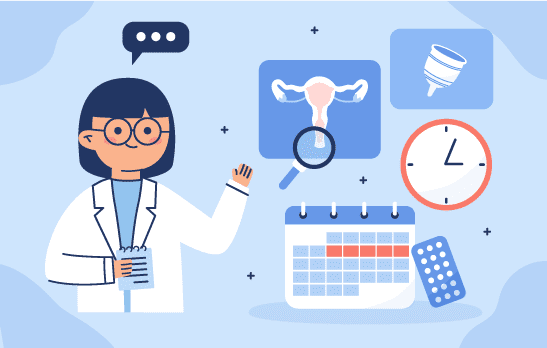Polycystic Ovarian Syndrome | PCOS
Polycystic Ovarian Syndrome (PCOS) has now become a common disorder worldwide causing infertility in women of childbearing age. The infertility rates are rising at an alarming rate with every 1 out of 10 women being detected with PCOS. As the name suggests, PCOS is the formation of many small cysts or one large cyst in the ovaries because of which the formation and release of an egg during the menstrual cycle for ovulation is affected.
In PCOS the amount of the male reproductive hormone, androgen increases abnormally surpassing the amount of estrogen, the female reproductive hormone, which causes a hormonal imbalance in the ovaries. The ovaries, under normal circumstances, release an egg for maturation as a part of the regular menstrual cycle, but with the hormonal imbalance and PCOS, the egg may not be developed or released as it should have given rise to delayed periods, unable to get pregnant and may even lead to infertility.
Women having PCOS are often insulin resistant, meaning their body can produce insulin but cannot utilize it, thus increasing their risk of developing type 2 diabetes in years to come. In fact, a study shows more than half of the women having PCOS developed type 2 diabetes by the time they were 40 years of age.
While there cannot be one particular reason as to why and how PCOS occurs, as the symptoms differ from woman to woman, sudden weight fluctuations remain a factor observed in women detected with PCOS. Some women showed sudden weight gain leading to obesity while others reported sudden and unexplainable weight loss. Obesity is one of the major risk factors that may cause PCOS and vice versa.
PCOS when detected early can be treated with proper medication and supplements to rectify the error in hormonal imbalance and other underlying factors to reverse the symptoms, although certain lifestyle modifications should be made to fasten the reversal process.
What are the indicators of PCOS?
PCOS can be detected at home by looking out for the following characteristics. These are the most common indicators of PCOS which can be further diagnosed by consulting a gynecologist.
-
Irregular periods – Tracking your period cycle to note when your last period cycle was can be helpful in knowing the regularity of your menstrual cycle. Usually, an average period cycle lasts 28 days. If you have had your last cycle longer than or shorter than these days, chances are, you have PCOS.
-
Excess androgen – An excess of androgen hormone can be detected if you have an irregular cycle, and have observed sudden thick hair growth on your body, especially on the chest, face, and chin, acne, and reduced breast size.
-
Polycystic ovaries – The most commonly found defect during PCOS is the presence of cysts in the ovaries which can be multiple small ones or one large one. These cysts are usually harmless until they block the passage of an egg from the ovaries for ovulation during the menstrual cycle, thus causing a delayed cycle.
What causes PCOS?
The exact cause of PCOS is not known yet, as it differs from woman to woman but the following reasons might be a contributing factor:
-
Insulin resistance (diabetes) – Women having PCOS have high insulin resistance compared to those who don’t have PCOS. Due to this insulin resistance, even though the body can produce insulin it is unable to use it which ultimately leads to diabetes.
-
Family history of PCOS – It can be said that PCOS runs in the family because if the mother or sister has had PCOS for a certain number of years, then the chances of the next girl in the family having PCOS too. Although this is not a compulsion.
-
Higher androgen levels – High androgen levels in the body cause a hormonal imbalance which gives rise to more health-related issues for women.
-
Obesity – Obesity is both the cause and after effect of PCOS with one developing in presence of another. It is advised for a woman with PCOS to look out for symptoms of obesity as it may also develop into other disorders like diabetes, heart disease, etc.
What are the symptoms of PCOS?
PCOS shows very few noticeable symptoms which need urgent attention and can be reversed with slight modifications in lifestyle. The symptoms of PCOS are:
- Missed periods, irregular periods
- Female Infertility
- Difficulty getting pregnant
- Large ovaries
- Cyst formation in ovaries
- Excessive body hair is also known as hirsutism
- Weight gain around the belly
- Acne and oily skin
- Male pattern baldness or thinning hair
- Dark or thick skin patches on the back of the neck, armpits, and under breasts
What are the risk factors of PCOS?
PCOS can give rise to a number of other ailments if not detected and treated in time. PCOS associated with obesity possesses a greater threat of developing the following disorders:
- Diabetes
- Gestational diabetes
- Heart disease
- High blood pressure
- High cholesterol
- Stroke
- Sleep apnea
- Depression and anxiety
How to deal with PCOS?
Women having PCOS can easily reverse the symptoms to some extent by making the following changes in their routine life:
- Better lifestyle choices
- Exercise
- Balanced diet
- Avoid stress
- Take proper supplements
AFD Pharma’s LYBER – PCO is the best PCOS supplement to ease the pain and suffering of women struggling with PCOS, improves hormonal balance and helps deal with PCOS symptoms. It improves the menstrual health and reproductive health of women. LYBER – PCO contains the apt 40:1 Myo and D-chiro inositol ratio which is the best combination for treating women suffering from PCOS. It helps improve the oocyte quality, oocyte maturation and maintains a healthy hormonal balance.
